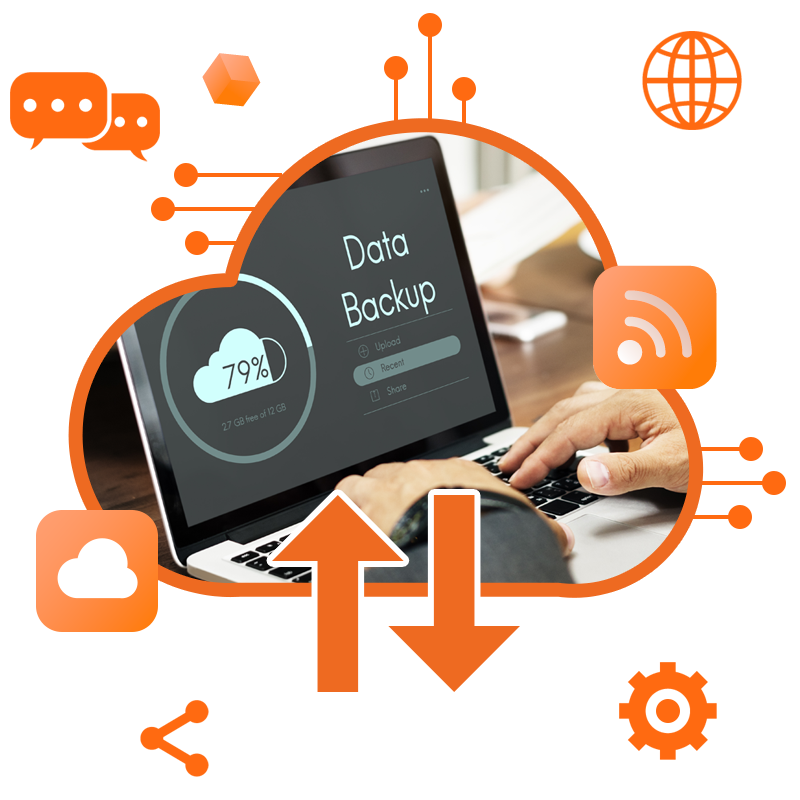Data Backup and Recovery
Data Solutions you can count on.
Worried about data loss? Our team is ready to help implement robust data solutions to securely backup your information so it can be restored quickly in the event of an incident thereby giving you peace of mind while minimizing downtime.


Data Backup and Recovery
Protecting Your Business Continuity with Robust Data Backup and Recovery
From tax records to client information, your data is essential in running your business. When it’s lost because of an unanticipated natural disaster or even worse, it is stolen, you need to make sure you can recover that data so your business can continue to thrive and grow without losing clients.
Data backup and recovery is the most important service you could ever sign up for. EK3 Technologies specializes in computer, data, and hard drive backup, as well as system recovery. We use a unique system that backs up all of your domain and server information and stores it in a dissimilar server off site so you’ll always be able to reaccess your data quickly.
With data backup and recovery services with us, here’s how you will benefit:
- Plan for unexpected issues – They happen to everyone, and they can happen at any time. Take preventative measures today.
- Safeguard and defend your business – EK3 Technologies protects your data, network, and systems from hacking or virus threats so you can focus on more important issues.
- Don’t wait long for recovery – When your network does go down and data is lost, we’ll have it back for you in no time.
Regardless of your business size, you need dependable data backup and recovery in Jacksonville and Tampa. EK3 Technologies can provide that to you – call today and prevent the unexpected from ruining your company.

Data Backups & Recovery Solutions You Can Count On
Keep Your Data Safe With Robust Solutions
EK3 Technologies provides dependable and reliable data solutions to securely backup & quickly restore your data in the event of loss.


Data Backup Solutions

Automated Backups

Secure Storage

Scalability

Version Control

Disaster Recovery Planning

User-Friendly Interfaces


Data Recovery Services

Specialized Expertise

Quick Turnaround

24/7 Availability
Evaluation and Diagnostics

Our Partners
Securing Your Data With
Leading Providers & Solutions





FAQ
Frequently Asked Questions

What is data backup, and why is it essential for businesses?
Data backup is the process of creating copies of your important data and storing them in a secure location. It is crucial for businesses because it provides a safety net in case of data loss due to hardware failures, data corruption, accidental deletion, or cybersecurity threats. A robust backup strategy ensures business continuity and minimizes downtime.
What are the different methods of data backup, and which is the best for my organization?
There are several data backup methods, including full backups, incremental backups, and differential backups. The best method depends on your specific needs. Full backups capture all data every time, while incremental and differential backups only save changes since the last backup. The choice may depend on factors like data volume, recovery time objectives, and available storage capacity. A combination of methods, often referred to as a hybrid approach, can provide the most comprehensive protection.
How often should I perform data backups?
The frequency of data backups should align with your organization’s data change rate and business requirements. Critical data should be backed up more frequently, possibly daily or in real-time, while less critical data may be backed up less frequently. It’s also important to regularly review and update your backup schedule as your data landscape evolves.
What is data recovery, and how can I ensure a successful data recovery process?
Data recovery is the process of restoring data from backups when it is lost or compromised. To ensure a successful data recovery, you should regularly test your backups to ensure they are viable. This involves simulating a recovery scenario to confirm that your backup copies are accessible and can be used to restore your data. Additionally, it’s essential to have a well-documented recovery plan in place and to know how to initiate the recovery process swiftly in the event of a data loss incident.

Contact Us
Contact Us Form

